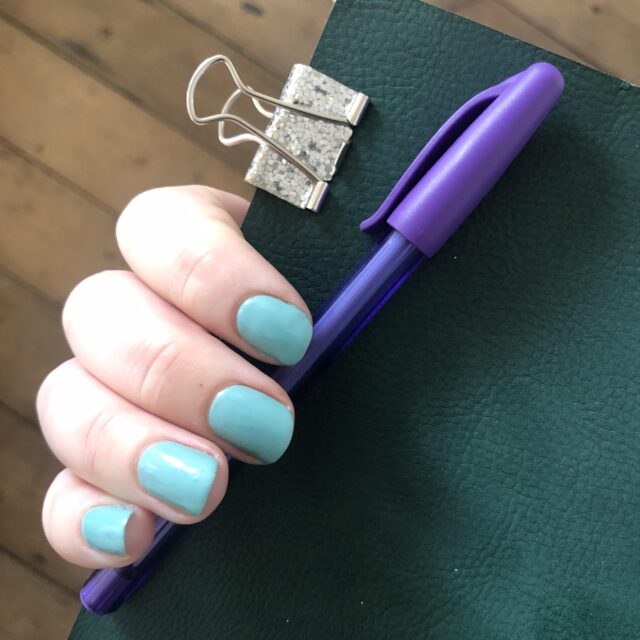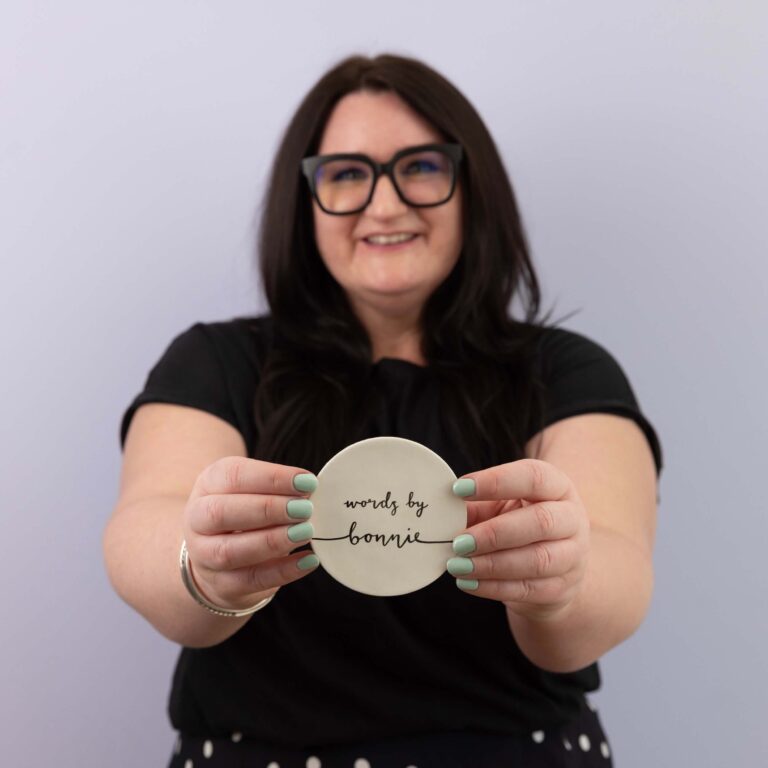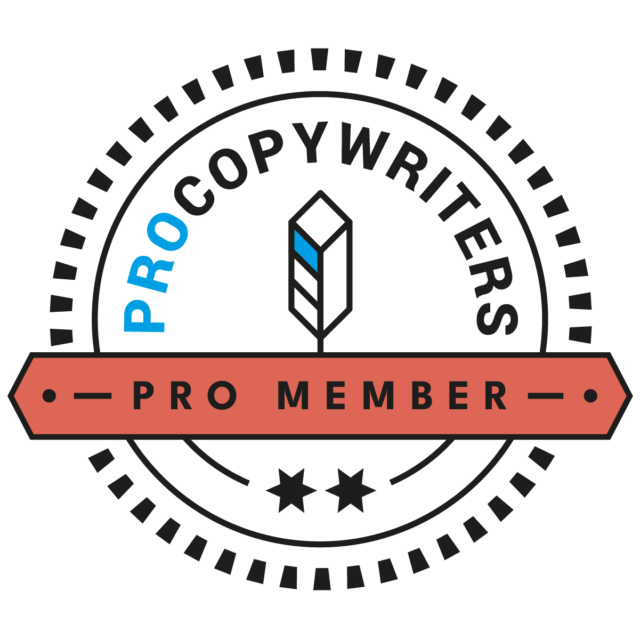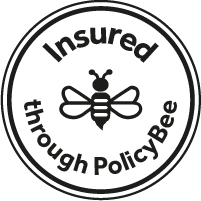Don’t fancy reading the whole blog? Just click on the heading above and it’ll take you right there.

What exactly is a copywriter?
Oh, if I had a pound for every time I’ve been asked this question…! I’d have approximately £15,000.
You are not alone if you’re not sure what a copywriter is. All my friends, a handful of ex- colleagues, my husband, complete strangers, and my dentist (literally today) have asked me what a copywriter is.
Despite it being my dream job, I didn’t know what a copywriter was myself until 2018.
ONE: How do I explain what a copywriter is?
This is the story of how I found out what a copywriter was.
I was talking to a friend. I was telling her how I was miserable in my job (English teaching in a secondary school). I said, “I want to be a writer, but not books… I want to write for people. Like, they can’t write something for themselves so they can pay me to do it…”.
She looked at me (sort of like a Labrador with their head cocked). Gently she said, “that is a job… it’s called a copywriter”.
Light. Bulb. Mo. Ment.
So that’s it. A copywriter is a professional writer who writes for your business. You need so many words to promote what you do. Website copy, blogs, product descriptions, emails, brochures… the list is almost endless.
Copywriters are experts in English, they understand the strategy of persuasive writing, and they write creatively. They know how to write in different tones of voice, in different formats, and for different audiences. And, it’s absolutely brilliant.

TWO: What does a copywriter write?
Strictly speaking, a copywriter writes pieces of writing- called ‘copy’- which inspires people to act. (Yes, ‘copywriter’ means ‘writing writer’. You’d think the original copywriters would’ve come up with a better name.)
The ‘inspiring people to act’ bit means the reader buys, clicks, likes, or signs up for something. This is called ‘converting’.
You might have a conversion after they see one add or read one sales email. It’s more likely that a customer will read quite a bit before they trust you enough to buy from you. They’ll probably check out your website, social media profiles, blogs, reviews, and/ or newsletter. Once they feel confident and reassured, they’ll make a purchase.
So, it’s a good idea for all written communication to be consistent, accurate, and as impressive as possible.
THREE: Do all copywriters write stuff for the internet?
Nope. Brochures, leaflets, packaging, and menus all need copywriters. Having said that, most of what I write does appear online.
Just about everything a business posts online has been written by a human. (Or AI, but honestly, the technology just cannot create accurate, personality- filled, impactful writing.)
Successful copywriting sounds like one person talking to one person. That’s hard to create when it’s a machine doing the writing.
Copywriters have highly specific skills. They write with deliberate tones of voice, accurate language, and a range of techniques, all of which gently prod the reader to make a decision.
The list of what copywriters, and content writers, write is almost endless.
- Adverts
- Blogs
- Brochures
- Case studies
- Decks
- Direct mail
- Digital resources
- eBooks
- Internal comms
- Landing pages
- Newsletters
- Podcast or video scripts
- Press releases
- Product descriptions
- Reports
- Sales emails
- Social media captions
- Taglines
- Website copy
- White papers
FOUR: What’s the difference between a copywriter and a content writer?
I’ve written a blog all about this. In short:
- Content writers typically write blogs, social media captions, newsletters, reports, and whitepapers
Content is all about informing and educating your audience. It builds brand awareness over time. It strengthens the relationship between the customer and the seller slowly. Through consistent messaging and regular content, customers will feel trust and loyalty. - Copywriters typically write website copy, landing pages, product descriptions, adverts, and sales emails
Copy is all about getting sales, or at least, an action from the reader. It’s deliberately written to persuade. Perhaps with an emotional story, or a funny tone, or simply by highlighting the benefits of the product/ service. Perfectly placed calls to action guide the reader what to do (‘buy now’, ‘click here’, ‘book a call’). Whatever the method, it’s about converting readers into customers.
Over time, the boundaries between copywriting and content writing have been blurred. Ultimately, there are many similarities.
Even when a piece of writing is ‘content’ there can still be features of copy, too. A blog, for example, should have strategic links to service pages or products. It’s just more subtle than the “book a call now!” vibes of a sales page. Even though there are links, the main point of the content isn’t to persuade.
Likewise, copy doesn’t have to be overtly “sales-y”. It could have a friendly, relaxed tone, similar to a blog. But it’ll be still be focused on getting sales and converting customers.
This is why there is confusion between copy and content. There are overlaps. Luckily for me, I love writing both copy and content.

FIVE: How do freelance copywriters work?
There are many types of copywriter, and many different ways of working. Some copywriters are employed directly by agencies or work inhouse for one brand. And there are freelancers, like me, who work for clients on a one- off basis.
Here’s how I work with my clients. Most freelancers will have a similar process, but ask them about it at the discovery call stage.
- We start with a discovery call, which lasts up to 30 minutes. This is where I learn exactly what you’re looking for, the deadline, and your budget.
- I’ll write you a proposal. If you’re happy to proceed, I’ll send you a contract and an invoice for 50% of the fee.
- It’s time for you to create a super detailed brief. I can help you with this.
- I write your first draft and send it to you. You tell me about anything which needs to be edited.
- I edit the first draft and send draft two back to you, with the final invoice.
- You upload the copy to your website, or send it to your email list, or post on social media. And, your customers start engaging!
- (And, perhaps you write me a lovely testimonial? Hey, a girl can dream!)
SIX: Do small business owners have to use a copywriter?
Nope. You absolutely can write your own copy and content. Just like people do their own taxes, design their own logos, or build their own websites.
But, if you’ve ever tried to DIY something (my first website) and then you’ve worked with a professional a bit later (thanks Studio Cotton) you know the pure relief and joy of having an expert handle something for you.
The truth is, a professional writer is going to write far better than a non- professional.
Writing your own copy and content is really, really difficult.
- Communicating exactly what you do, who you do it for, and how you do it
- Speaking directly to your customer, understanding their needs and desires
- Perfectly placing headlines, calls to actions, and buttons to get sales
- Subtly overcoming the barriers customers might have in buying from you
- Structuring the writing so it’s not too long, too short, too boring, or too complex.
- Writing in a clear, consistent tone of voice which is accessible to everyone
- And, of course, every word, punctuation mark, and sentence has to be accurate.
It’s no small task. It’s why there’s so much bad copy out there. It’s not easy to get right.
SEVEN: What skills do you need to be a good copywriter?
Communication, communication, communication. That means both listening and talking, but mostly listening.
Next, you need to be able to write. Not just with accurate grammar, spelling, and punctuation (although that is crucial). We’re talking different formats, different tones of voice, and with a creative flair.
There are some very specific copywriting skills which you might learn in a copywriting course. These include; writing for different audiences, SEO, branding, CTAs, how to write headlines, and how to structure a piece of writing.
All good copywriters have the skills I’ve mentioned. The best copywriters have relentlessly high standards.
- High standards for the writing they produce
- High standards for the service they provide
- High standards for the research they conduct
- High standards for the ethical impacts of their work

EIGHT: What qualifications do you need to be a copywriter?
Anyone can call themselves a copywriter. They can simply set up a website and start working with clients with no formal training. Decide to be a copywriter and BAM! You’re a copywriter.
There is a huge upside to this. If you want to be a copywriter you don’t have to delay earning money until you’re “qualified”. The downside is… there’s a great deal of poor copy out there. It’s important to do tons of preparation before launching as a copywriting and working with clients. Personally, after I completed my copywriting course, I wrote for a few businesses for free. Their feedback was incredibly helpful for me before I ever earned a penny.
If you’re interested in becoming a copywriter there are lots of free resources which to help. I find myself returning to:
- Mailchimp’s style guide
- this blog on how writing for your target audience by Helen Writes
- SEMrush’s excellent tone of voice breakdown.
Of course, you could do some courses. I did this one, and this one, both of which were more introductory/ basic. I’ve also got my eye on this one.
NINE: How do you know if a copywriter is good?
There are a number of ways to reassure yourself you’re working with a good copywriter.
✅ Check out their work in a portfolio. See if their other clients are similar to you, check the quality of their writing, and see if you align
✅ Can they clearly explain their method of working? Do you fully understand what they offer, how and when they invoice, how many drafts are included?
✅ Both you and the copywriter should sign a contract. And then, there should be a clear, signed off brief of what you want
✅ Check if the copywriter is insured, registered with the ICO, and has policies on their website
✅ Do they have a consistent online presence and belong to professional bodies?
✅In all written communication to you, they should be writing accurately and clearly. Sure there might be an odd typo here and there in an email- we’re all human. But, you should feel confident the copywriter has a very firm grasp of the English language.
TEN: How much do copywriters cost?
The price of a copywriting very much depends on:
- The industry you belong to
- The value the copy will bring
- The length of the copy (shorter does not mean cheaper!)
- How much research is needed for the copy
- What the copy is used for
- How quickly you need the copy
- How many edits you’ll need in the copy
- If you have your tone of voice and brand guidelines sorted already
I’ve explained my pricing here. And, here is the ProCopywriters annual survey which explains the copywriter day rate.
As with everything, you get what you pay for. Paying someone a fair rate means they can devote time and energy to your project. ‘Getting a bargain’ means it’s unlikely you’ll get the quality or accuracy you’re hoping for. The copywriter will have to take on lots of low- rate projects to make a living. Inevitably, they’ll have to spend less time and energy on your project.
Consider copywriting as an investment in your business. Just like the investment you’d make in training, photography, website design, and necessary software. These are things which make you more professional, and more profitable. If you want to work with a copywriter but you’re worried about the cost, you have options. You might be eligible to apply for a local business grant. The copywriter might be up for a skill swap. You could even choose a copywriter who offers payment plans.
There you go! A comprehensive guide to just about everything copywriting. Still have questions? I love them! Ask away and I’ll help you out.









